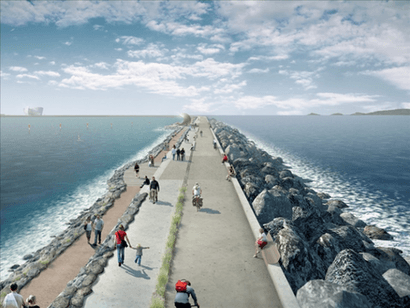
Tidal Lagoon Swansea Bay has given a cautious welcome to the review of tidal lagoon technology by the UK government, although Mark Shorrock, the company’s chief executive, has expressed some concern about the resulting delay in considering the demonstration project. Swansea Bay Tidal Lagoon is an appropriately small pilot project that gives rise to large scale projects. Investing in the project could add as little as 10p to householder’s bills while the first large scale lagoon to employ its blueprint could take £5 off householder’s bills.
“It is imperative that we conclude our structuring and commercial negotiation with Government within the next 6 weeks” Mr Shorrock said. “This is entirely possible; the review should not impact the finalisation of our commercial discussions. To unlock the potential of tidal lagoon power, we need investment in a demonstration project that will grow the supply chain and build investor confidence that an exceptionally long term project can go forward in today’s UK electricity market. We want to give birth to a tidal range industry. We want to return steel workers into jobs. We want to make our own turbines and generators here in the UK, we want to bestow a legacy on Great Britain from Wales of 120 year life power. But none of this will be possible if we don’t start now.”
Mr Shorrock added that the review is a huge step for the government and sends a clear signal that it sees potential advantage for the UK energy consumer in very long-dated tidal energy infrastructure assets. However, it should not be considered as a substitute for action. There is a serious and growing gap of electricity generation capacity and the country currently needs at least 16 new large scale power stations. The cheapest new power stations will be tidal lagoons, roof-top solar power and gas fired power stations. The UK needs all three quickly, probably alongside the nuclear power stations when they are ready, although the timescales for nuclear are more uncertain.
The UK has become a completely regulated market where all operators and technology forms - from fossil fuel, to nuclear, to renewable - depend on direct or indirect subsidy. The favour shown to foreign technology providers for non-hydro low carbon energies - solar, biomass, wind, and especially nuclear – has resulted in lost jobs, lost time and lost baseload power. Mr Shorrock said that the tidal lagoon fleet will break this unfavourable tradition, capitalising on a natural advantage. The project will be able to deliver baseload power at the same scale as nuclear but at lower cost.
Given the vast potential for tidal lagoon power to provide cheap long-term renewable energy at scale and to be taken formally into national policy, the company welcomes the opportunity to put the case for a major programme of cost-effective power.
Mr Shorrock said that the project is ready to go now. The company has built a project team, secured planning permission, secured equity sponsors, prepared a delivery team and a supply chain. The project has received overwhelming support locally, nationally and internationally.
The government’s review of the project will assess whether or not tidal lagoon technology represents value for money. It covers not just the Swansea Bay project but tidal lagoons in general and will commence in the spring of this year. The government’s aim in launching the review is to help to establish an evidence base in order to ensure all decisions made regarding the technology are in the UK’s best interests.
“Tidal Lagoons on this scale are an exciting, but as yet an untested technology” said UK Energy Minister Lord Bourne. “I want to better understand whether tidal lagoons can be cost effective, and what their impact on bills will be - both today and in the longer term. This review will help give us that clarity so we can determine what role tidal lagoons could have as part of our plans to provide secure, clean and affordable energy for families and businesses across the country.”
The review will assess whether, and in what circumstances, tidal lagoons could play a cost-effective role as part of the UK energy mix. It will also consider the potential scale of opportunity in the UK and internationally, including within supply chains. Other matters to be considered by the review will include possible financing structures, different sizes for first of a kind projects and whether a competitive framework could be put in place for the delivery of tidal lagoon projects.
The Department of Energy & Climate Change (DECC) and HM Treasury will act as consultants to the review, the latter with regard to its financial aspects.
For additional information:

